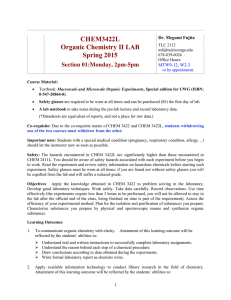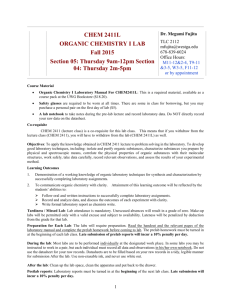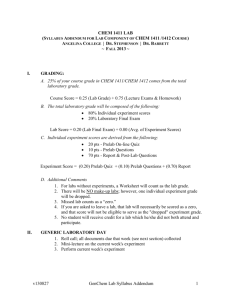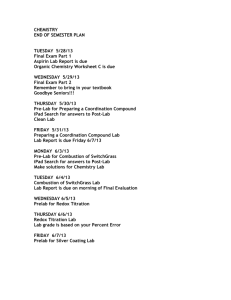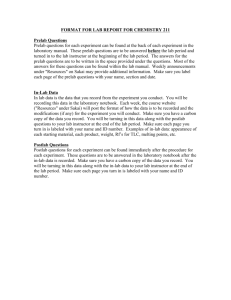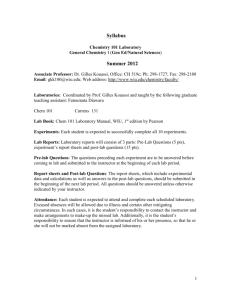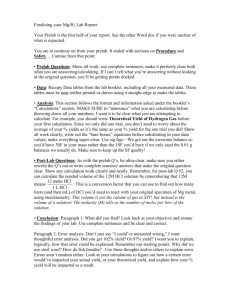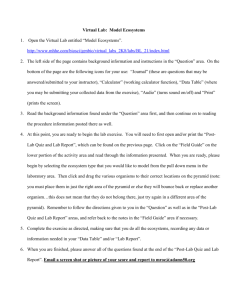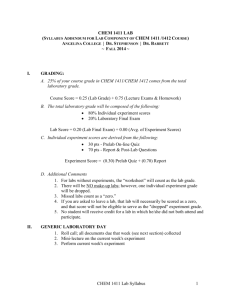syllabus - The University of West Georgia
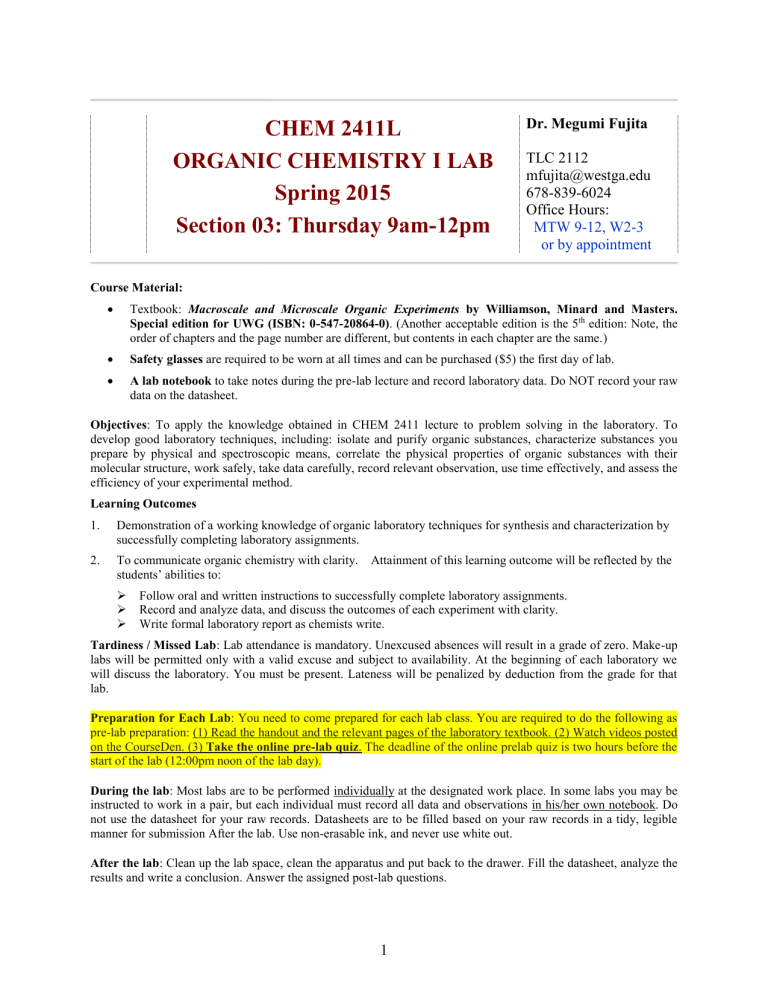
CHEM 2411L
ORGANIC CHEMISTRY I LAB
Spring 2015
Section 03: Thursday 9am-12pm
Dr. Megumi Fujita
TLC 2112 mfujita@westga.edu
678-839-6024
Office Hours:
MTW 9-12, W2-3
or by appointment
Course Material:
Textbook: Macroscale and Microscale Organic Experiments by Williamson, Minard and Masters.
Special edition for UWG (ISBN: 0-547-20864-0) . (Another acceptable edition is the 5 th edition: Note, the order of chapters and the page number are different, but contents in each chapter are the same.)
Safety glasses are required to be worn at all times and can be purchased ($5) the first day of lab.
A lab notebook to take notes during the pre-lab lecture and record laboratory data. Do NOT record your raw data on the datasheet.
Objectives : To apply the knowledge obtained in CHEM 2411 lecture to problem solving in the laboratory. To develop good laboratory techniques, including: isolate and purify organic substances, characterize substances you prepare by physical and spectroscopic means, correlate the physical properties of organic substances with their molecular structure, work safely, take data carefully, record relevant observation, use time effectively, and assess the efficiency of your experimental method.
Learning Outcomes
1. Demonstration of a working knowledge of organic laboratory techniques for synthesis and characterization by successfully completing laboratory assignments.
2. To communicate organic chemistry with clarity. Attainment of this learning outcome will be reflected by the students’ abilities to:
Follow oral and written instructions to successfully complete laboratory assignments.
Record and analyze data, and discuss the outcomes of each experiment with clarity.
Write formal laboratory report as chemists write.
Tardiness / Missed Lab : Lab attendance is mandatory. Unexcused absences will result in a grade of zero. Make-up labs will be permitted only with a valid excuse and subject to availability. At the beginning of each laboratory we will discuss the laboratory. You must be present. Lateness will be penalized by deduction from the grade for that lab.
Preparation for Each Lab : You need to come prepared for each lab class. You are required to do the following as pre-lab preparation: (1) Read the handout and the relevant pages of the laboratory textbook. (2) Watch videos posted on the CourseDen. (3) Take the online pre-lab quiz . The deadline of the online prelab quiz is two hours before the start of the lab (12:00pm noon of the lab day).
During the lab : Most labs are to be performed individually at the designated work place. In some labs you may be instructed to work in a pair, but each individual must record all data and observations in his/her own notebook. Do not use the datasheet for your raw records. Datasheets are to be filled based on your raw records in a tidy, legible manner for submission After the lab. Use non-erasable ink, and never use white out.
After the lab : Clean up the lab space, clean the apparatus and put back to the drawer. Fill the datasheet, analyze the results and write a conclusion. Answer the assigned post-lab questions.
1
Reports : Laboratory reports and answers to the post-lab questions are to be turned in at the beginning of the next lab. The answers to the post-lab questions must be submitted with the report/data sheets. Late reports will incur a
10% penalty for each day the report is late.
Academic Misconduct : Honesty in reporting results is one of the essential characteristics of your laboratory work.
Any form of academic dishonesty or misconduct will be penalized to the fullest extent possible, including a grade of zero in the assignment or grade of F for the entire course, or in a serious case, expulsion from the university.
Falsifying data includes (but is not limited to) fabrication of data for lab work you did not do, and changing poor data to better-looking data. Little of your grade depends on getting "good" quantitative results; you will be more severely penalized for misrepresenting results than for honestly reporting "poor" results. For lab reports (including formal reports), you must write your own report as an individual work , and copying ANY part of other people’s work is considered a serious academic misconduct . This includes (but not limited to) experimental procedure, data, tables, reaction equation and mechanisms, discussion and conclusions, and answers to prelab/postlab questions. The grade obtained for such reports will be zero for both the one who copied and the one who let the other copy. Any type of cheating for the final exam will result in a grade F for the entire course.
Grades
Lab reports (60%), Prelab quizzes (10%), Lab final exam (20%), Instructor points (5%), RTK (5%)
Instructor points : your instructor will assign points based upon your readiness for each lab, punctuality, ability to work within the time assigned, respect for safety rules, respect for the instructor, TAs and other students, cooperation, attitude, performance, and tidiness.
Online Environmental Health & Safety test : Complete the following TWO programs under http://www.usg.edu/ehs/training by the second lab period .
1.
Right-To-Know Basic Awareness with the Global Harmonized System
Hazardous Waste Awareness
2.
*At the end of each online training, a Certificate will be displayed. Instead of printing them, please save the screen image as “Basic_Your-last-name” or “Hazardous_Your-last-name” (with your own last name), and deposit the pictures to the dropbox in the CourseDen. This way we will reduce paper consumption. The record of completion will also be sent to UWG Risk Management office, and the completion will be confirmed at a later date. If you have completed these RTK training earlier this academic year (August
2014-) and can present the evidence, you may do so.
Grading Scale : 90-100 A, 80-89 B, 70-79 C, 60-69 D, <59 F
Please Note : CHEM 2411 (lecture class) is a co-requisite for this lab class. This means that if you withdraw from the lecture class (CHEM 2411), you will have to withdraw from the lab (CHEM 2411L) as well.
Contact : Only UWG e-mails will be read and dealt with. Also there is a CourseDen site linked with this class where you can check for announcements, access the syllabus and your grades at any time. Information displayed on
CourseDen is supposed to be known by the student.
Important course policies:
Follow all the safety rules described in the Safety Contract. Especially be mindful of the following:
You must wear safety glasses all the time. If you were found not wearing safety glasses, you will be expelled from the lab. I will strictly enforce this policy all year long.
Make sure to wear closed-toe shoes all the time during the lab. If you wear any open-toed shoes, you are not allowed to do a lab and you will receive a grade of zero.
The use of cell phones and any electronic devices is forbidden at any time during the lab period.
Exception is when a use of a stopwatch or timer function for specified experiments only.
The time required to perform the experiment is usually 3 hours, if you leave before the end of the lab, you must have all the data proving that you have actually performed the experiment and you must ask me if it is
OK for you to leave.
2
Check-in Procedure
1) Pick your bench space where you can find a check-in slip.
-
Up to 3 persons per bench (up to 18 students per each side of the lab)
2) Check-in slip will be given from the instructor or a TA.
-
WRITE DOWN YOUR DRAWER NUMBER AND COMBINATION for your record. You will need this information for the entire semester.
3) Check that all items of equipment listed on the check-in form (see pp. 15-16 for the names of the items) are included in your drawer. Please note that you do not need the syringe (Fig. 1.15-l), magnetic stirrer bars and vial (Fig. 1.15-e), and the polyethylene tubing (Fig. 1.15-u).
4) Pick up missing equipment from the instructor or a TA.
5) Sign and give the check-in slip to the instructor, along with your safety contract.
LABORATORY SCHEDULE
1/27,29 3
2/3,5 4
2/10,12
2/17,19
5
6
2/24,26
3/3,5
3/10,12
3/17,19
3/24,26
4/7,9
4/14,16
7
8
11
9
10
Week of Lab #
1/13,15 1
1/20,22 2
Experiment
Chapters 1,2,3: Check-in, Safety, and Melting Points of an
Unknown Solid
Chapter 4: Recrystallization of an Unknown Solid
Handout, Molecular Modeling
Chapter 8, Thin Layer Chromatography (TLC)
Chapter 9, Column Chromatography: Separation of Plant
Pigments
Chapter 7, Extraction: #1 Separation of a mixture of 3 unknown solids
Chapter 7, Continued
Handout, Tests for Alkane/Alkene
Chapter 58, Handout, Bromination of Stilbene
Spring break
Handout, IR and MS
Chapter 17, Nucleophilic Substitution Reactions of Alkyl
Halides
Checkout and Lab Final Exam
Assignment & Report
Data Sheet + Post-lab Qs
Prelab Quiz,
Data Sheet + Post-lab Qs
(No prelab)
Datasheet
Prelab Quiz,
Data Sheet + Post-lab Qs
Prelab Quiz,
Data Sheet + Post-lab Qs
Prelab Quiz
Prelab Quiz,
Formal Report
Prelab Quiz,
Data Sheet + Post-lab Qs
Prelab Quiz, in-class postlab Qs, Formal Report
Prelab Quiz, Worksheet
Prelab Quiz,
Data Sheet + Post-lab Qs
3
